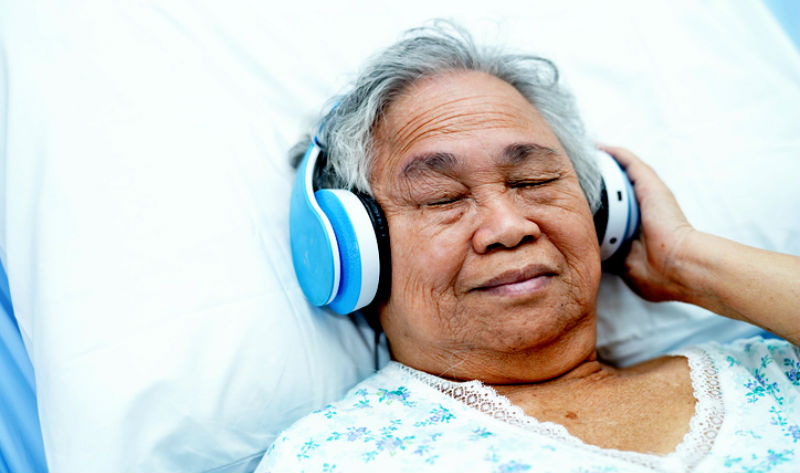Even this will not be enough to overcome the incompetence of your doctors and stroke hospital. Music therapy for stroke has been out there for years. It is YOUR RESPONSIBILITY to bring your stroke hospital up-to-date. I would suggest firing all the staff and the board of directors. Such incompetence can't be tolerated.
43 posts on music therapy. Back to Oct. 2014
74 posts on music Back to March 2011
How music therapy provides real clinical results
John Murphy, MDLinx | August 19, 2019
Music has been linked with medicine for
centuries, but only recently have researchers made demonstrable progress
in using music to improve medical outcomes in various conditions, such
as stroke, coronary heart disease, pain, Alzheimer disease, and others.
Take note that music therapy isn’t the equivalent of smooth jazz playing in the background at the dentist’s office (although that may certainly induce a positive effect). Like physical, occupational, and speech therapy, music therapy is a discipline unto itself.
Established as a profession in the United States in 1950, music therapy is the “clinical and evidence-based use of music interventions to accomplish individualized goals within a therapeutic relationship by a credentialed professional who has completed an approved music therapy program,” according to the American Music Therapy Association.
In music therapy, a patient can be actively involved (through singing, playing an instrument, or even dancing) or be a receptive listener (paying direct attention to the music). The music therapist creates a music playlist that can be chosen by the therapist or individualized to the patient (and sometimes chosen by the patient).
Much more research, in the form of clinical trials, needs to be done to better validate the effects of music therapy. But in the meantime, here are just a few conditions in which music therapy has been shown to provide specific benefits.
After a person has a stroke, an essential part of rehabilitation focuses on mobility. In numerous studies
, researchers have shown that music therapy, in the form of RAS, can improve a range of mobility parameters, including gait velocity, stride length, general gait, and possibly gait cadence. RAS with music (eg, a song with a strong, consistent beat) appears to have a greater effect than RAS without music (ie, the ticking of a metronome). Playing musical instruments may also help patients regain functional motor skills. In one study, stroke patients who were trained to play on an electronic keyboard or electronic drums showed significant increases in speed, precision, and smoothness of movements. Their motor control in everyday activities also improved significantly compared with control patients.
Take note that music therapy isn’t the equivalent of smooth jazz playing in the background at the dentist’s office (although that may certainly induce a positive effect). Like physical, occupational, and speech therapy, music therapy is a discipline unto itself.
Established as a profession in the United States in 1950, music therapy is the “clinical and evidence-based use of music interventions to accomplish individualized goals within a therapeutic relationship by a credentialed professional who has completed an approved music therapy program,” according to the American Music Therapy Association.
In music therapy, a patient can be actively involved (through singing, playing an instrument, or even dancing) or be a receptive listener (paying direct attention to the music). The music therapist creates a music playlist that can be chosen by the therapist or individualized to the patient (and sometimes chosen by the patient).
Much more research, in the form of clinical trials, needs to be done to better validate the effects of music therapy. But in the meantime, here are just a few conditions in which music therapy has been shown to provide specific benefits.
Stroke
Rhythmic auditory stimulation (RAS) involves synchronizing a patient’s movement—eg, hitting the ground with the foot during walking—to an external auditory cue, such as the ticking of a metronome or the sound of the drumbeat in music. The rhythm of this synchronization can facilitate physical rehabilitation.After a person has a stroke, an essential part of rehabilitation focuses on mobility. In numerous studies
, researchers have shown that music therapy, in the form of RAS, can improve a range of mobility parameters, including gait velocity, stride length, general gait, and possibly gait cadence. RAS with music (eg, a song with a strong, consistent beat) appears to have a greater effect than RAS without music (ie, the ticking of a metronome). Playing musical instruments may also help patients regain functional motor skills. In one study, stroke patients who were trained to play on an electronic keyboard or electronic drums showed significant increases in speed, precision, and smoothness of movements. Their motor control in everyday activities also improved significantly compared with control patients.
 Music therapy is more than just the
feeling of relaxation when listening to music. Clinical trials have
shown evidence of positive benefits for a variety of conditions.
Music therapy is more than just the
feeling of relaxation when listening to music. Clinical trials have
shown evidence of positive benefits for a variety of conditions.
No comments:
Post a Comment